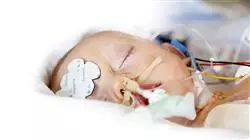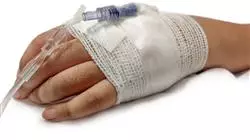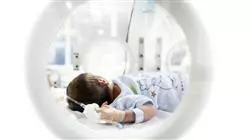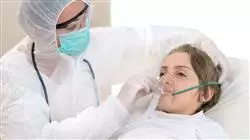University certificate
The world's largest faculty of medicine”
Description
Access the latest news in the field of Hospital Pediatrics and learn the most recent advances in cyanogenic cardiopathies or in demyelinating diseases that affect pediatric patients”

Among the existing hospital services, pediatrics treats some of the most delicate patients. It is, therefore, a complex area and has series of specific problems for which the latest tools must be available. In recent years there have been numerous advances in this field and, thanks to this program, physicians have access to the best knowledge to help them face current challenges in Hospital Pediatrics.
This professional master’s degree proposes an exhaustive update in this area, and for that purpose it focuses on the most recent discoveries related to issues such as acute disseminated encephalomyelitis, truncus arteriosus, polydipsia and polyuria, adenomegaly and hepatosplenomegaly, among many other pathologies. All this, applied to pediatric patients in the hospital environment.
To undertake this learning process, an innovative e-learning methodology is used so physicians can decide how, when and where to study, which is perfect for practicing professionals. Furthermore, the teaching process is carried out through the use of numerous multimedia resources such as video procedures and techniques, interactive summaries and master classes, among others. In addition, you will be guided at all times by prestigious specialists who will transmit all their knowledge to the professionals who enroll in the program.
Delve into the main innovations on the most common pathologies in hospital pediatrics with this program”
This professional master’s degree in Hospital Pediatrics contains the most complete and up to date scientific program on the market. Its most notable features are:
- Practical case studies are presented by experts in hospital pediatrics
- The graphic, schematic, and eminently practical contents with which they are created, provide scientific and practical information on the disciplines that are essential for professional practice
- Practical exercises where the self assessment process can be carried out to improve learning
- Special emphasis on innovative methodologies
- Theoretical lessons, questions to the expert, debate forums on controversial topics, and individual reflection assignments
- Access to content from any fixed or portable device with an Internet connection
Hospital Pediatrics is a complex area that requires physicians to constantly update their knowledge. This degree will bring you up to date in the discipline in a simple way, without having to put your professional career to one side”
The program’s teaching staff includes professionals from the sector who contribute their work experience to this program, as well as renowned specialists from leading societies and prestigious universities.
The multimedia content, developed with the latest educational technology, will provide the professional with situated and contextual learning, i.e., a simulated environment that will provide an immersive program designed to learn in real situations.
This program is designed around Problem-Based Learning, whereby the professional must try to solve the different professional practice situations that arise during the academic year. For this purpose, the student will be assisted by an innovative interactive video system created by renowned and experienced experts.
This program will show you the latest advances in treatments for numerous pediatric pathologies"

Get up to speed in the constantly evolving field of Hospital Pediatrics”
Objectives
The main objective of this professional master’s degree in Hospital Pediatrics is to update specialists’ knowledge in the field by following the latest scientific findings. In order to achieve this, it proposes an in-depth study of a series of procedures and pathologies that affect pediatric patients, taking into account the most recent developments in the discipline. Therefore, at the end of the program, physicians will have gained up-to-date knowledge on relevant issues such as pediatric hemato-oncology.

Complete this innovative program and achieve all your professional goals thanks to TECH”
General Objectives
- Master the latest techniques and knowledge in modern hospital pediatrics
- Become proficient in pediatric patient management, ensuring maximum quality and safety during the process
- Develop exemplary skills to provide high-quality care, guaranteeing patient safety based on the latest scientific evidence
- Gain up-to-date knowledge of hospital pediatrics
Specific Objectives
Module 1. Treating Critically Ill Children Outside of the Pediatric Intensive Care Unit
- Delve deeper into the different hospital practices regarding initial child management in life threatening situations due to acute hemodynamic, respiratory and/or neurological involvement
- Gain up-to-date knowledge of rapid intubation sequence and advanced cardiopulmonary resuscitation in children according to the latest ILCOR 2021 recommendations
- Master practical diagnosis and therapy management for children disconnected from the environment
- Know the course of action in case of epilepticus
- Deal with allergic reactions and anaphylaxis, oxygen therapy, fluid therapy, ECG, analgesia and sedation, and be introduced to thoracic ultrasound
Module 2. Infectious Diseases in Pediatrics
- Focus on key issues such as antibiotic policy and isolation measures
- Analyze the most frequent infectious pathologies through new algorithms and protocols, as well as traveler and immigrant infections and new emerging viruses
Module 3. Respiratory Diseases in Pediatrics
- Delve deeper into chronic respiratory pathologies of frequent hospitalization such as bronchopulmonary dysplasia, interstitial lung disease, cystic fibrosis, patients with neuromuscular pathology
- Master the latest diagnosis and monitoring procedures and new therapies
Module 4. Digestive System Diseases in Pediatrics
- Take a deeper look into clinical cases and different algorithms in the diagnosis, management and updated therapeutic measures for different pathologies, some very frequent such as abdominal pain and gastroesophageal reflux, and other emerging ones such as eosinophilic esophagitis and biliary lithiasis
- Manage chronic diarrhea, whose etiology is varied and which can be the expression of a benign process or of a serious disease
- Gain up-to-date knowledge of inflammatory bowel disease and hepatic dysfunction, which require a high diagnostic suspicion, since they can cause, if detection is delayed, serious complications causing a decline in patient quality of life
- Delve into gastrointestinal bleeding which, although infrequent, can have potentially severe consequences
Module 5. Neurological Disorders in Pediatrics
- Develop the diagnostic approach and practical aspects of antiepileptic drugs, as well as the diagnostic approach to hypotonic infants and the most frequent conditions such as headaches, or acute conditions such as ataxia, pediatric stroke, or demyelinating diseases, among others
Module 6. Cardiac Diseases in Pediatrics
- Discover new diagnostic modalities in pediatric cardiology: echocardiographic strain, transesophageal echocardiography, among others
- Delve deeper into the differential diagnosis for suspected heart disease in newborns, early diagnosis and initial stabilization treatment
- Know the clinical approach to heart disease given current regulations, as well as cardiac flow obstruction pictures, the key ideas behind arrhythmias detection, pathologies acquired in childhood, and suspected heart failure in infants and children and new challenges
Module 7. Endocrine System, Metabolism and Nutrition in Pediatrics
- Delve deeper into nutritional assessment and the most frequent alterations observed during hospital admission, early diagnosis and therapeutic lines
- Adopt a critical attitude toward new trends in diet and the possible deficiencies they can generate
- Know when to suspect the presence of a metabolic disease, as well as different clinical pictures, some of which frequent, such as hypoglycemia, diabetic onset and control using new technologies, polyuria – polydipsia and suspected adrenal insufficiency
Module 8. Nephrology and Water and Electrolyte Disorders in Pediatrics
- Offer a global vision of the most frequent pathologies found in hospital admissions through clinical cases, deepening in hematuria-proteinuria, nephrotic syndrome and acute renal damage, arterial hypertension and renal lithiasis, which are becoming more and more common
- Bring new diagnostic and therapeutic algorithms to the nephrological area
Module 9. Pediatric Hemato-Oncology
- Using updated algorithms and clinical cases, explore simple approaches to the most common conditions such as anemia, purpura and neutropenia
- Know the indications for transfusions and anticoagulation
- Approach oncologic emergencies and the differential diagnosis of adenomegaly, hepato-splenomegaly and macrophage activity syndrome
Module 10. Other Pediatric Processes
- Interpret skin lesions and apparent lethal episodes
- Manage complex pediatric patients
- Address pediatric intensive care, palliative care, maltreatment and sexual abuse
- Master standard procedures and new technologies
- Delve into the mental health and safety of pediatric patients in a hospital setting

Your goal is to update your knowledge in Hospital Pediatrics and you will do so thanks to this professional master’s degree”
Professional Master's Degree in Hospital Pediatrics, Master Pediatric Intensive Care, Master Infectious Diseases in Pediatrics, Master Respiratory Diseases in Pediatrics, Master Digestive Diseases in Pediatrics, Master Neurological Disorders in Pediatrics, Master Pediatric processes, Master Hemato-oncology in Pediatrics, Master Nephrology in Pediatrics, Master Hydroelectrolytic disorders in Pediatrics, Master Endocrine system in Pediatrics, Master Nutrition in Pediatrics,







